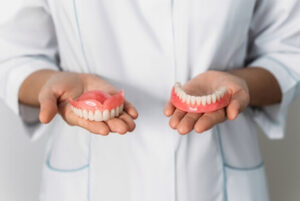Dentures are a vital solution for many Australians dealing with significant tooth loss. They improve the ability to masticate and speak and restore a natural appearance to the face. Understanding the cost of dentures and the options available is crucial for anyone considering this type of dental treatment.
This article provides a detailed look into the various factors influencing denture costs, types of dentures, and why timely action in managing tooth loss is essential.
Introduction to Dentures
Understanding the Different Types of Dentures
Dentures are broadly classified into two categories based on the extent of tooth loss they are designed to address:
Complete Dentures
Complete dentures are suitable for individuals who have lost all their teeth in either the upper or lower jaw. These dentures rest directly on the gums and primarily stay in place through suction, although adhesives may also be used to enhance their stability. This setup ensures that the dentures remain secure during daily activities, providing both functional and aesthetic benefits to the wearer. This design ensures that the dentures stay securely in position throughout daily activities like speaking and eating.
They are crucial for those who have experienced complete tooth loss, as they help restore both functionality and aesthetics. The design of complete dentures encompasses the entire arch, requiring precise craftsmanship to ensure they fit comfortably and appear natural.
Partial Dentures
Partial dentures offer a practical solution for individuals who haven’t lost all their natural teeth. Partial dentures are especially advantageous when one or more natural teeth still remain in either the upper or lower jaw. These dentures fill the gaps left by missing teeth, not only helping to restore a full smile but also preventing the remaining teeth from shifting out of their correct positions. This helps maintain the overall structural integrity and alignment of the dental arch, contributing to better oral health and functionality. This helps maintain the overall alignment and health of your mouth.
These dentures generally consist of replacement teeth attached to a pink or gum-coloured plastic base. Often, they are supported by a metal framework that helps secure the denture firmly within the mouth.
Cost Factors of Dentures
Several key factors can affect the cost of dentures. It’s crucial for individuals considering this option to understand these variables to prepare financially for a significant investment in their oral health and quality of life.
Materials Used for Dentures
The choice of material from which dentures are made is a significant cost determinant. Different materials not only impact the appearance and comfort of the dentures but also their durability and price:
Acrylic Resin: Acrylic is widely used for its versatility and cost-effectiveness. It can be easily coloured to match the natural gum and is relatively easy to adjust and repair. However, it tends to wear faster than other materials, requiring more frequent replacements.
Porcelain: Known for its aesthetic appeal, porcelain dentures mimic the look and feel of natural teeth better than most materials. They are also very durable, resistant to wear, and maintain their colour well. The downside is their cost, which is higher than acrylic, and their weight, which some users may find uncomfortable.
Flexible Materials: These include newer types of non-rigid dentures made from nylon or other flexible composites. They offer a lightweight, more comfortable fit and aesthetic appeal but at a higher cost than traditional materials.
Type of Dentures
The kind of dentures you need is another critical factor influencing cost:
Complete Dentures: These replace all teeth on the upper or lower jaw and involve a more extensive manufacturing process, thus generally costing more.
Partial Dentures: Used when some natural teeth remain, partial dentures are typically less expensive than complete ones because they involve fewer materials and less labour.
Immediate Dentures: These are prepared in advance and can be placed immediately after tooth extraction. They are more expensive due to the need for more precise initial planning and adjustments to ensure comfort as the gums heal.
Conventional Dentures: These are made after the gums have healed following tooth extraction, usually taking 4-6 weeks. This delay can reduce initial costs but means a longer period without teeth.
Dental Clinic and Dentist Fees
Fees vary significantly between practitioners and depend on their experience, the technology they use, and the service level provided. More experienced dentists or those in advanced cosmetic dentistry typically charge more.
Geographic Location
The location of the dental practice can greatly influence the cost of dentures. Urban areas typically see higher charges for dental services than rural areas. Moreover, costs can vary between different states and territories due to differences in the local economy and access to dental services.
Additional Dental Services
Often, obtaining dentures involves more than just the creation and fitting of the prosthetic:
Oral Surgery: Some patients may require surgery to reshape the jawbone or treat advanced gum disease before they can comfortably wear dentures.
Preparatory Treatments: Some patients may need treatment for oral health issues like gum disease before dentures can be fitted, which can add to the overall cost.
Understanding these factors can help potential denture wearers plan appropriately and set realistic expectations for the financial investment required. It’s advisable to consult with a dentist to get a detailed estimate based on specific needs and conditions.
Insurance and Health Coverage for Dentures
Navigating the world of private health insurance for dental care, particularly for dentures, can significantly reduce the financial burden of this necessary treatment. Understanding the specifics of your insurance coverage, the extent of that coverage, and any applicable conditions, such as waiting periods, is essential for anyone considering dentures.
Understanding Health Insurance Coverage for Dentures
Most private health insurance plans in Australia include some level of dental coverage, which often extends to dentures. However, the specifics can vary widely between policies and providers. Here are some key aspects to consider:
General Dental vs. Major Dental Coverage: Insurance policies typically categorise dental care into ‘general dental’ and ‘major dental’ services. Dentures usually fall under major dental services, which have higher coverage limits but also longer waiting periods and higher premiums.
The extent of Coverage: The amount that insurance covers for dentures can vary. Some policies cover a set percentage of the cost, such as 50%, while others offer a fixed dollar amount. It’s important to check what your plan specifies.
Caps and Limits: Many dental insurance plans have annual limits on how much they will pay for dental care. Once these limits are reached, the patient is responsible for any additional costs. Understanding these caps is crucial as they can affect how much you spend out of pocket.
Waiting Periods
One of the common features of dental insurance is the waiting period, which is the time you must wait after buying the policy before you can claim benefits. For major dental procedures like dentures, waiting periods typically range from 6 to 12 months. If you anticipate needing dentures, planning and securing insurance well in advance is wise.
Pre-Existing Conditions
Some insurance policies may have clauses regarding pre-existing conditions. If tooth loss occurred before acquiring the insurance, some insurers might consider this a pre-existing condition and limit coverage or require a longer waiting period. It’s important to clarify this with your insurance provider.
Tips for Maximising Dental Insurance Benefits
Explore our practical tips below on how to maximise your dental insurance benefits and ensure you get the most value out of your policy regarding denture-related expenses.
Review and Compare Policies
Before choosing a policy, compare different dental insurance plans to see which offers the best coverage for dentures at the most reasonable cost.
Understand the Policy Details
Read the fine print regarding dentures, including any restrictions or requirements for specific materials or types of dentures.
Preemptive Planning
Plan dental treatments around the insurance coverage, keeping in mind waiting periods and annual limits.
Consult Your Dentist
Insurance can make a big difference in managing the cost of dentures. By fully understanding your coverage and planning accordingly, you can optimise your benefits while minimising out-of-pocket expenses.
Always verify the specifics with your insurer to avoid unexpected costs and ensure your treatment meets your needs and budget.
Choosing the Right Denture Clinic
Selecting the right denture clinic is essential for ensuring high-quality dentures that fit your mouth perfectly. Look for clinics that offer a thorough initial consultation and have good reviews from past patients.
Importance of an Initial Consultation
An initial consultation allows the dentist to assess your specific needs, discuss different denture options, and outline the denture procedure, including any preparatory dental treatment that might be necessary.
The Role of Dental Professional
Dentists work on the design, construction, fitting, and adjustment of removable dentures. They work closely with patients to create dentures that offer the best fit and function.
Maintaining Your Dentures
Proper denture care is crucial for prolonging their life and ensuring good oral hygiene. Regular cleaning, avoiding certain foods, and routine check-ups are part of maintaining your dentures.
Daily Denture Care
Cleaning your dentures daily is essential to prevent plaque buildup and gum disease. Use a soft-bristled brush and special denture cleaner, not regular toothpaste, because it can be too abrasive.
Regular Dental Check-ups
Regular check-ups with your dentist are important to adjust the fit of your dentures as needed and to check for any issues with your oral health.
Frequently Asked Questions
For more information about common queries about dentures, please refer to our Frequently Asked Questions section below.
Can I eat normally with dentures?
Yes, you can eat normally with dentures, though there is an adjustment period. Initially, it’s best to start with soft foods cut into small pieces. As you grow more accustomed to your dentures, you’ll be able to gradually reintroduce harder and stickier foods into your diet. However, be cautious with particularly hard or sticky foods, as they can pose ongoing challenges for denture wearers.
How long do dentures last?
Dentures last between 5 to 8 years but can last longer with proper care. Over time, dentures may wear out or become loose due to natural changes in the shape of your mouth and gums and bone loss in the jaw.
Regular check-ups with your dentist are important to adjust the fit of your dentures and to make any necessary repairs or replacements. Maintaining good oral hygiene and handling your dentures carefully also helps extend their lifespan.
Are there alternatives to dentures?
Fixed bridges offer another alternative and are securely cemented to either the remaining natural teeth or to implants located next to the gap. It’s essential to discuss both options with your dentist. This conversation is crucial for determining the best treatment that aligns with your specific dental needs, lifestyle, and budget, ensuring you receive the most suitable and effective care possible.
Conclusion: Why Act Now?
Replacing missing teeth with dentures not only enhances your smile and facial aesthetics but also improves your overall health and quality of life. Delays in addressing tooth loss can lead to further oral health issues, making treatment more complex and expensive. Reach out to us today to schedule your consultation and take the first step towards a healthier, more vibrant smile.
Our team is ready to provide you with high-quality, personalised dental care to restore your smile.
Contact MyHM Dentist at 02 9158 6379 to claim the smile you always wanted!
References:
https://my.clevelandclinic.org/health/treatments/10900-dentures
https://www.aihw.gov.au/reports/dental-oral-health/oral-health-and-dental-care-in-australia/contents/private-health-insurance
https://www.webmd.com/oral-health/dental-health-dentures
https://www.colgate.com/en-us/oral-health/dentures/what-are-dentures-made-of








